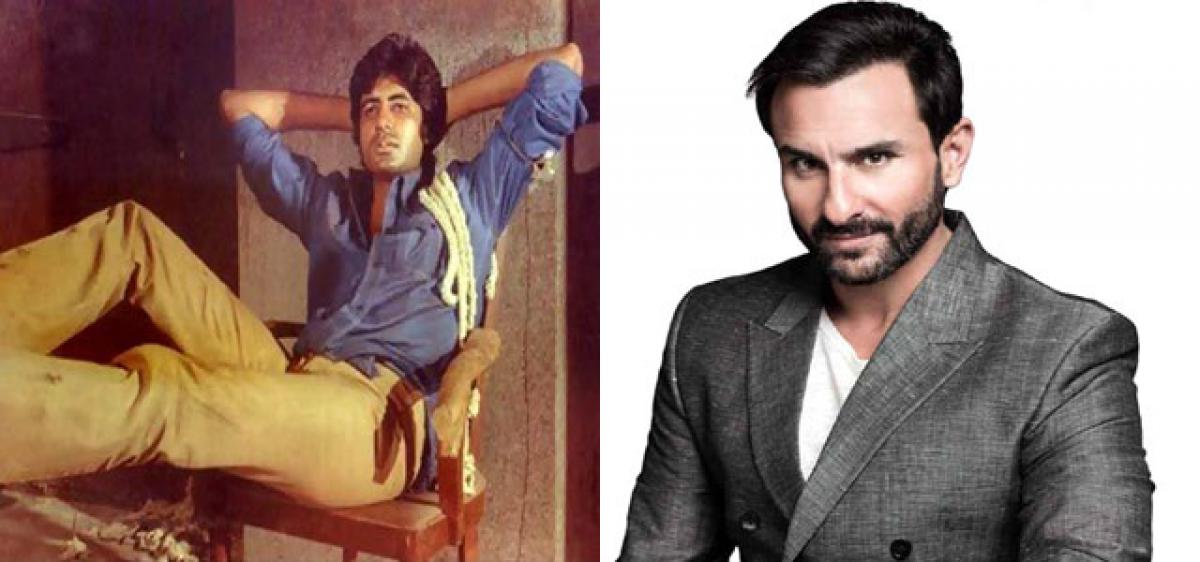Live
- Shreyas Iyer to lead Mumbai as Prithvi Shaw returns for Syed Mushtaq Ali Trophy
- 'Failed to resolve crisis': NPP withdraws support from BJP govt in Manipur
- Chennai: Actress Kasturi Remanded in Custody Until 29th of This Month
- Aaqib Javed likely to become Pakistan's new white-ball head coach
- BJP panel to draft poll charge sheet against AAP govt in Delhi
- Allu Arjun Thanks Fans in Patna, Teases 'Pushpa 2' Release
- Japan to strengthen measures against illegal part-time jobs
- Gahlot resignation: Delhi Congress calls AAP a sinking ship
- Consultative body on doctors' walkout fails to narrow differences in South Korea
- Honouring bravehearts: Army commemorates Nuranang Day
Just In

For long Amitabh ruled the screen in the 1970s. For long his critics cribbed about how he was being typecast. In those days, spoiled as the audiences were by some of our best cinema coming in week after week and year after year, a lot many thought the critics were right.
When actors bag accolades for their performances, the filmmakers in the industry tend to typecast them and make their performance dull and boring
For long Amitabh ruled the screen in the 1970s. For long his critics cribbed about how he was being typecast. In those days, spoiled as the audiences were by some of our best cinema coming in week after week and year after year, a lot many thought the critics were right.
People wondered if Amitabh could be different, with little realisation that his acts in Yash Chopra movie were so different from the way a Manmohan Desai would present him. Ramesh Sippy could have never presented him the way Prakash Mehra would.
Typecast and boring repetitive characterisation of our film stars, is actually taking place now. Yes, in this day and age when we think our cinema has become different bold and big. Sample some of these. Before you read on please note my sarcasm is intended to make you smile and maybe wake up our Bollywood writers, not to insult these great actors.
Shraddha Kapoor
She is the modern generation's Meena Kumari – director's favourite tragedy queen. In ‘Ek Villain’ she is a terminally ill girl, who is about to die, however, she miraculously recovers to be killed again. In ‘Rock On 2’ her brother commits suicide, and daddy is depressed. In ‘Aashiqui 2’, she is depressed, falls in love with another alcoholic and depressed guy who gets more depressed because he feels he is a bad choice for the girl so he kills himself to give Shraddha a depression free life, only those who loved getting depressed like this one and ‘Aashiqui 2's box office numbers proved there are many who like to get depressed. In ‘Half Girlfriend’, she is terminally ill and as an added tragedy bonus her family is messed up too. One day you will see Shraddha Kapoor in a David Dhawan movie and probably still cry while she attempts comedy.
Saif Ali Khan
The guy was doing love triangles when India was considering liberalisation. The guy was doing love triangles when India was suffering the initial hiccups of liberalisation. The guy was doing love triangles when India was booming as an economy due to positive effects of liberalisation. He is still doing love triangles as India has become used to liberalisation. The only difference is sometimes two ladies fight over him, or he is one of the two guys fighting for the lady. ‘Rangoon’ was his latest. ‘Aao Pyaar Karein’ to ‘Cocktail’ to ‘Rangoon’ this man lives in simple predictable stories. Another ten years on the same route and we have our next Dev Anand ready.
Kangana Ranaut
She is the tragedy sister of Shraddha Kapoor. Either she dies in some of her best movies or her lover dies or they both die. If no one is dead she either goes through a lot of pain or causes pain. You can find evidence of my theory in movies like ‘Gangster’, ‘Rangoon’, ‘Tanu Weds Manu’ movies, ‘Wo Lamhe’, etc. Her ‘woman-struck-with-tragedy’, and fast dialogue delivery makes her the strongest contender in female Nana Patekar bracket. A few more Vishal Bharadwaj and Bhatt camp movies and the lady will hit the bracket for sure.
Vidya Balan
She is the first commercial movies "liberated woman". What started as great stuff with ‘Ishqiya’ and ‘The Dirty Picture’ has now become boring and drag. ‘Kahaani 2’ became confused between brand liberated Vidya and movies thrill value. ‘Begum Jaan’ was Silk of ‘The Dirty Picture’ with more clothes to wear. Despite her putting in so much of energy and effort audiences got bored because Vidya Balan has got typecast. The dialogues of her recent movies sound like recycled versions of what she has already spoken about society, situations, and men before.
Compare this with what Big B did in the 1970s and probably we will realise how harsh we were on our lambu!

© 2024 Hyderabad Media House Limited/The Hans India. All rights reserved. Powered by hocalwire.com







